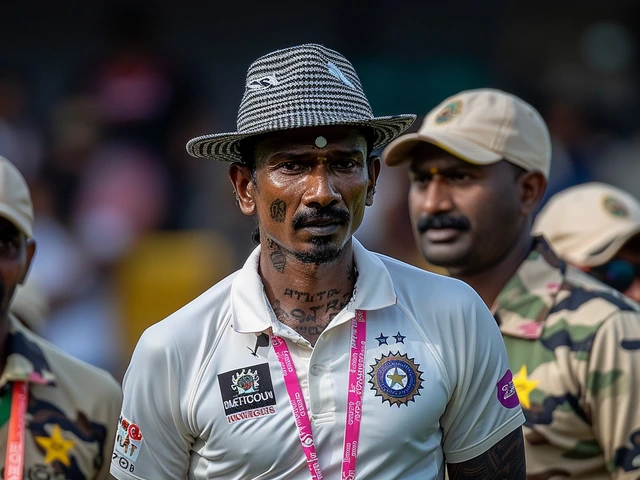On the morning of November 15, 2024, armed men in Lagos State uniforms stormed a private property in Lekki—despite a clear, active court order protecting it. The target? The home and development site of retired Nigerian Navy Admiral Festus Porbeni, former Minister of Transportation. Witnesses say the raiders, identified as members of the Lagos State Special Task Force, were backed by heavily armed police officers. They beat staff, dragged people into a police van nicknamed the ‘Black Maria,’ and threatened to bulldoze every structure on the land. The twist? A Federal High Court injunction (FHC/L/CS/1384/21) had been in place since 2021—and renewed just days before, on November 14, 2024—by Justice Daniel Osiagor. This wasn’t just a violation. It was a public slap at Nigeria’s judiciary.
The Property That Won’t Stay Quiet
The disputed land, B20 Wole Olateju Crescent, Lekki Phase 1, isn’t just any plot. Admiral Porbeni and his company, Admiralty Fleet Limited, say they’ve held regulatory approvals since 2008, including development permission from the National Inland Waterways Authority (NIWA), where Porbeni once served. They’ve invested millions, built infrastructure, and occupied the site continuously. But in 2021, Lagos State officials showed up claiming the land was government property. The courts didn’t agree. Justice Osiagor issued an injunction on October 18, 2021, halting any allocation or interference. That order was reaffirmed on November 5, 2021, and again on November 14, 2024—just one day before the raid.It’s rare for a court to renew an injunction so precisely, so recently. That makes the November 15 raid not just unlawful—it’s brazen. Legal experts say this level of disregard suggests either reckless arrogance or a coordinated effort to force a land grab before the courts can react again.
Who Spoke Up—and Who Didn’t
The first public outcry came from the Good Governance Alliance – Nigeria (GGA-N), a civil society group led by Nathaniel Obasi. In a statement, they called the incident “a recipe for lawlessness and chaos.” They demanded immediate action from the Chief Justice of Nigeria, the Inspector-General of Police, and Governor Babajide Sanwo-Olu of Lagos State.Meanwhile, the state government stayed silent. No press release. No denial. No explanation. That silence speaks louder than any statement could. In contrast, Admiral Porbeni’s legal team, led by Senior Advocate of Nigeria Abiodun A. Olatunji, moved swiftly. On November 14, they secured the renewed injunction. On November 17, they formally notified the court of the breach. Now, they’re pushing for contempt proceedings.
“This isn’t the first time,” Olatunji told reporters. “They’ve done this before. Each time, we go to court. Each time, they come back. The message is clear: they don’t fear the law.”

The June 2025 Petition: A Pattern of Timing
Here’s the odd part: On June 4, 2025, Porbeni’s team filed a petition to the Inspector-General of Police, citing a Lagos State High Court ex parte order served on June 3, 2025—just hours before a public holiday. Why does that matter? Because it’s a known tactic: serve legal documents right before a weekend or holiday, when courts are closed and legal recourse becomes nearly impossible. The plaintiffs argue this wasn’t an accident. It was strategy.They’re invoking Section 43 of the Nigerian Constitution, which guarantees every citizen the right to own and develop property. Yet, the repeated raids suggest that for some, the rule of law is negotiable—especially when land values in Lekki are skyrocketing. The property in question sits near Admiralty Way, one of Lagos’s most valuable corridors. Real estate here now sells for over ₦150 million per plot. That’s not just land. It’s wealth.
What’s Next: Contempt, Chaos, or Clarity?
Justice Osiagor now faces a critical decision. Will he issue a contempt citation against Lagos State officials? If he does, it could set a national precedent. Contempt of court is rarely enforced against state agencies—even when they blatantly violate orders. But if he acts, it signals that even powerful governors aren’t above the law. If he doesn’t, it tells every agency in Nigeria that court orders are just suggestions.Meanwhile, the Lagos State Special Task Force remains active, and the state’s Attorney-General has made no public comment. The silence isn’t just concerning—it’s dangerous. When state actors feel immune to judicial oversight, democracy weakens. This isn’t just about one property. It’s about whether Nigeria’s courts can still protect citizens from state overreach.

History Repeats Itself
This isn’t the first time Lagos State has clashed with courts over land. In 2019, the state forcibly cleared the Epe waterfront, ignoring a Supreme Court order. In 2020, a similar raid occurred in Surulere, where residents were evicted despite a pending appeal. Each time, the state claimed “public interest.” Each time, the courts ruled against them. Yet the pattern persists. That’s not policy. That’s impunity.Admiral Porbeni, now 72, is a decorated officer who served Nigeria for over 30 years. He’s not a protestor. He’s not a radical. He’s a retired public servant trying to build something legitimate. And now, he’s being treated like a criminal—by the very government that once swore to uphold the law.
Frequently Asked Questions
What legal actions can be taken against Lagos State for violating the court order?
Admiral Porbeni’s legal team is seeking contempt of court charges against Lagos State officials, including the Attorney-General and Special Task Force leaders. If proven, this could lead to fines, asset freezes, or even personal liability for those who ordered or carried out the raid. Contempt proceedings are rare against state agencies, but not impossible—especially when there’s video evidence, witness testimony, and multiple prior violations.
Why did the court renew the injunction just one day before the raid?
The renewal on November 14, 2024, came after new evidence surfaced showing Lagos State had resumed land allocation activities despite the 2021 injunction. Justice Osiagor’s swift action suggests he was aware of escalating threats. The timing implies the court anticipated possible non-compliance—and was trying to reinforce its authority. The raid the next day makes it look like a deliberate provocation.
How does this affect ordinary Lagos residents?
If the state can ignore court orders on high-value land, no citizen is safe. Property rights are the foundation of economic security. When the government can raid homes and developments with impunity, it erodes trust in institutions. Thousands of Lagosians hold land titles or pending approvals—they’re watching this case closely, wondering if their own homes could be next.
Is there any precedent for a governor being held accountable for court violations?
Not directly. Governors in Nigeria have never been personally jailed for contempt. But in 2017, a court froze the account of a state government for refusing to release funds ordered by a tribunal. In 2020, the Supreme Court ordered the removal of a state official for defying a ruling. These cases show that while governors are rarely punished, the courts can still apply pressure—through finances, sanctions, or public shaming.
What role does the Inspector-General of Police play in this?
The IGP is responsible for police conduct nationwide. The raid involved mobile policemen, meaning federal law enforcement was present. If the police participated in enforcing an illegal order, the IGP could be compelled to investigate them internally—or face accusations of complicity. The June 2025 petition to the IGP suggests plaintiffs believe federal oversight may be the only check left.
Why is this case gaining national attention now?
Because it’s a perfect storm: a decorated veteran, a clear court order, armed state agents, and silence from power. Social media has amplified the footage of the raid. Legal experts are calling it a test case for judicial independence. With elections approaching, the public is watching whether the state will be held accountable—or if the message is that power trumps law.





14 Comments
Elizabeth Price
November 11, 2025 AT 08:53 AMWait-so the state raided a property with a court order still active? That’s not just illegal, it’s a farce. And you’re telling me the police were involved? That’s not enforcement, that’s collusion. The fact that this keeps happening means the judiciary is a joke. Nigeria’s courts are like a broken alarm clock: they still tick, but no one listens anymore. And the governor? Silent. Of course he is. He’s the one who ordered it.
Steve Cox
November 12, 2025 AT 14:39 PMThis whole thing is just another example of why Nigeria will never progress. You have a decorated admiral who’s done everything by the book, and the state sends armed thugs to his house because the land is valuable? That’s not governance-that’s organized theft with a uniform. And nobody in power says a word? No wonder people are leaving. This isn’t about land. It’s about who gets to be above the law. And the answer? Whoever has the most money or the most guns.
Aaron Leclaire
November 13, 2025 AT 11:52 AMThey broke the law. End of story.
Gabriel Clark
November 13, 2025 AT 19:06 PMIt’s deeply concerning when state institutions operate with such blatant disregard for judicial authority. The renewal of the injunction just 24 hours prior to the raid suggests not only foreknowledge of potential noncompliance but also a calculated act of defiance. This is not negligence-it is institutionalized contempt. The precedent set here, if unchallenged, will embolden similar actions across the country. Property rights, the bedrock of civil society, are being eroded by impunity.
Elizabeth Alfonso Prieto
November 14, 2025 AT 04:35 AMOMG I’m literally crying right now… this is so unfair!! Like, how can anyone sleep at night after doing this?? That poor man, he served his country!! And now they’re dragging people in black vans?? I just can’t… I’m so angry I could scream!! Someone please do something!!
jesse pinlac
November 14, 2025 AT 20:30 PMOne must question the epistemological foundations of governance in a polity where judicial decrees are treated as mere suggestions. The Lagos State Special Task Force’s actions constitute not merely a breach of procedural law, but a metaphysical assault on the rule of law itself. The silence of the Attorney-General is not neutrality-it is complicity in the ontological collapse of constitutional order. This is not governance. It is necropolitics dressed in khaki.
Jess Bryan
November 16, 2025 AT 07:38 AMLet’s be real-this isn’t about land. It’s about the deep state. The military-industrial complex in Nigeria has been laundering land through shell companies for decades. The admiral? He’s a pawn. The real owners? They’re the ones pulling strings from behind the scenes. The court order? A distraction. The raid? A message to anyone who dares to own anything valuable. And the police? They’re just the foot soldiers. Don’t believe the surface story. Look at the money trail.
Steven Rodriguez
November 18, 2025 AT 06:50 AMThey think they’re slick? Throwing armed thugs at a retired admiral’s property? Please. This isn’t Lagos-it’s a banana republic with Wi-Fi. The guy spent 30 years defending this nation, and now the same government that gave him a pension sends goons to smash his dreams? That’s not just criminal-it’s cowardly. And the silence from the top? That’s the real crime. If you let them do this to a decorated veteran, what’s next? Your house? Your child’s school? This isn’t about land. It’s about fear. And we’re running out of people brave enough to call it out.
Zara Lawrence
November 18, 2025 AT 18:37 PMGiven the historical precedent of state-sanctioned land seizures in Lagos-Epe, Surulere, now Lekki-it is not unreasonable to posit a systemic pattern of institutionalized dispossession. The fact that the court’s injunction was renewed immediately prior to the raid suggests not merely a failure of enforcement, but a deliberate provocation designed to test the judiciary’s resolve. The absence of a public response from the Attorney-General is, in my view, tantamount to an official endorsement of extrajudicial violence. This is not governance. It is the normalization of tyranny.
Kelly Ellzey
November 20, 2025 AT 11:35 AMIt breaks my heart to see a man who gave so much to his country treated like this… but I still believe in justice. People are watching. The world is watching. And this story? It’s going to go viral. I’ve shared it with every group I’m in. We need to keep pressure on. The courts need to act. And if they don’t? Then we have to make them. This isn’t just about one man-it’s about every Nigerian who believes in fairness. We can’t give up. Not now. Not ever.
maggie barnes
November 22, 2025 AT 02:51 AMok so the court order was renewed the day before?? so they knew it was coming?? this is so obvious it’s laughable. the state just wanted to make a point. like ‘we don’t care’ and they did it on purpose. and now everyone’s acting shocked? please. this happens ALL THE TIME. and nobody gets punished. not even a slap on the wrist. so why would they stop? it’s not about the land. it’s about power. and power doesn’t care about laws. only fear. and right now? they’re winning.
Lewis Hardy
November 23, 2025 AT 22:11 PMI’ve worked with veterans in my community. They don’t ask for much. Just respect. And here’s a man who served his country for three decades, built something honest, and now gets treated like a criminal because his land is valuable? That’s not just wrong. It’s soul-crushing. I don’t know if the courts will act-but I know this: if they don’t, we’ve already lost something bigger than property. We’ve lost faith. And that’s the real tragedy.
Prakash.s Peter
November 25, 2025 AT 07:44 AMLet me be clear: the Nigerian judiciary has no teeth. The Lagos State government operates with impunity because the federal institutions are either corrupt or incompetent. The admiral’s legal team may have the injunction-but without enforcement, it is a piece of paper. The real issue is not the raid. It is the fact that no one in Abuja will hold Lagos accountable. Why? Because Lagos is the economic engine. And engines don’t get fined-they get bribed.
ria ariyani
November 25, 2025 AT 16:54 PMso like… what if this was all staged?? like… what if the admiral DIDN’T even have the court order?? what if this is all a PR stunt to get sympathy and money?? i mean… why now? why after 3 years? why not before? something smells fishy here… like… who benefits? who’s funding this narrative? i’m not saying he’s guilty… but… why the sudden drama??